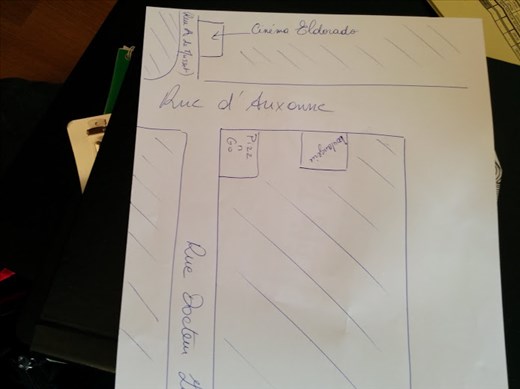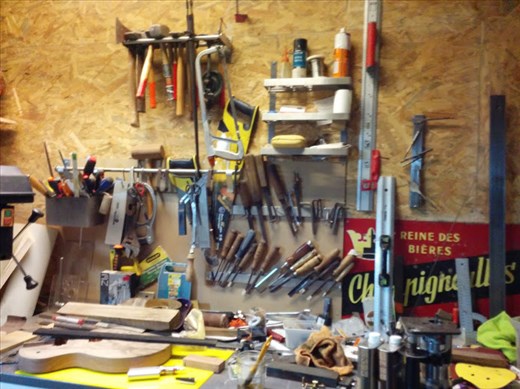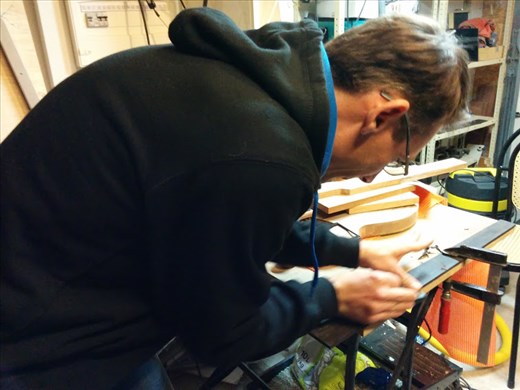After getting up on Saturday, Laure gave me a mission: to go to the bakery and pick up the viennoiseries she'd ordered. To help me with this mission, she drew me a map.

Her theory with giving me this mission was that out would allow me to speak French organically, and also allow me to see a little bit of Dijon. One street. And not a terribly interesting one. But still Dijon.
I can't say it taught me a whole lot about the difference between city and smaller city life in France, but that walk did reveal a lot about how quickly I'd adjusted to living in a city. Because I got to the light and stopped. And waited. And waited. And eventually realised that if I wanted a walk light, I'd need to press the button. Weird...
I returned to Laure's and we sat down to breakfast. The plan for today was to meet up with several other (anglophone) girls and head over to a barbeque at the house of some friends of Laure from the country. Laure had several things she needed to do first, and was trying to come up with things to entertain me until then, so she was rather relieved when I mentioned I had homework to do. So she went off, and I sat down on the couch with Euclid and my tablet and pretended I was being productive.
A bit later, Alex (Scottish), Charlotte (English), and Sarah (Canadian) showed up. We all piled into Laure’s car and drove into the country. There, we met up with Alain and Mathilde (French) as well as Sarah, (American) who had arrived previously by train. Since I was being introduced to French people by a mutual French friend, the proper greeting was to faire des bises. Which was an authentic French experience, although it felt awkward.
Fortunately, the “barbecue” part of the lunch had already been prepared, since it was raining when we arrived. It continued to rain on and off for most of the afternoon, which did not change the plan of eating outside. There was a glass covering for the patio, so the rain just provided nice background noise.
Alain and Mathilde had two children (a boy who was around two and a girl who was under five) and a cat named Copernique. Copernique was very fluffy and very, very happy to be given kind attention (I imagine being a cat around young children would have that effect.) He also liked sitting outside with a blissful ignorance of the problems that came with that. So he was sprawled on the doorstep when we were trying to get in and out, and when he rematerialized near the end, his fur was very wet.
We began with appetizers, light conversation, and a white wine. I discovered what people meant when they called a wine “sweet.” My experience with wine is pretty limited, specifically, it’s limited almost exclusively to dry wines. So while I knew there were dry and sweet wines, I’d assumed they were just names, and that people didn’t actually mean “sweet as in sugar” sweet. That white wine changed my belief, because it tasted like what Moroccan wine would taste like if most Moroccans drank alcohol. It took me a few sips to get past the impression of it being overly sweet and enjoy the taste.
There were two types of meat for the main course- lamb and guinea fowl. (Mathilde knew the name in French, but not English, and after a couple of guesses, we needed to rely on online dictionaries to tell give us a translation. We were far enough in the country to not get a signal, but fortunately I had an offline dictionary on my phone. So the question could change from “what’s the name of this animal?” to “what is a guinea fowl anyway?” Answer: that thing I was eating.) And, of course, they served Dijon mustard to go with it. Four different flavors. (Did you know that there were flavors of Dijon mustard? I did not until this weekend.) I had some honey and vinegar mustard, (it sounded much more interesting in French than it does when I translate it and rearrange things to get “honey mustard”) which, when I spread it thin enough, I found tasty. Otherwise it was a bit strong.
About halfway through that course, Mathilde came to her senses and realized that we were still drinking white wine. With lamb and fowl! White wine doesn’t go with those! So she went in to get a bottle of red wine to offer to us. Alain sniffed it and then asked if there was plumb in the wine, which caught American Sarah by surprise. “You can tell that? Just by smelling it? How?” Which led to a very interesting discussion with Mathilde as she described her experience of becoming a coffee connoisseur. She’s an electrical engineer who’s currently working with coffee makers. And, to understand what exactly the coffee machine needs to do, she needs to understand all of the factors that change the taste and feel of a cup of coffee as it goes from beans to liquid. I’d previously heard people talking about the acidity and texture that comes from different ways of brewing coffee, but this was the first time I’d heard someone talk about it in a way that didn’t imply she’d been born a coffee prodigy. She mentioned that the process of learning to identify and appreciate the differences changed the way she tastes food as well. It doesn’t make her a better cook, since taste is so subjective, but it would probably give her a launching pad if she wanted to change her career completely and become a food critic. Taste is generally an under-utilized sense, but, as Alain commented, Mathilde’s experience is hardly unique. People who study music intensely can’t help but hear the harmonies and movements in a piece. I’ve had to stop myself from staring at strangers because I liked their hat or sweater, and want to reverse-engineer it. When you spend enough time learning how to do something well, it changes the way you see the world.
A bit later, Alain started asking American Sarah about politics. (She’d mentioned taking a political theory class, and Alain jumped at the opportunity to get an American’s perspective on Iran and Cuba.) Erin had warned us that French people generally liked discussing politics more than Americans, and we should prepare by reading a newspaper on the train ride there. My options for conversation were pretty much to join the discussion with Mathilde, Alain, and Sarah, or join the English conversation with Laure and the other anglophones. Besides, I might not have much to say about Iran, but I could talk about Cuba.
Alain and Sarah discussed Iran and the reasons for the “rapprochement.” Then Alain added that, though he could see the economic reasons for that, he didn’t understand what Barack Obama was doing with Cuba. At which point I jumped into the conversation and did my best to explain that, although there might not be any imminent political motivation for improving relations, there was absolutely no reason to keep the policy the same as what it had been for the past fifty years. I surprised them by mentioning that North Korea was not on the list of state sponsors of terror, and talked about how, as long as the United States kept up things like the embargo, Cuba was able to point to them as the enemy and gain a lot of sympathy from other countries. I don’t think I had a coherent thesis, but I managed to get my points across.
We moved on from Cuba to China, and then to Japan. Talking about politics is not something I’m super good at doing in English, so adding the additional language issue made it more challenging. But between a basic familiarity with current events, a deeper understanding of several countries by having been there, things I’d heard (and remembered) from people who liked discussing politics, and above all, a willingness to try and express my ideas in French, I was able to contribute to the conversation. It was certainly a worthwhile experience, even if it was difficult.
Although Alain would have been quite content to keep discussing politics for a while, Mathilde was ready to move the conversation on to something that could include the other people. So she brought out dessert and coffee, and Alain came out with Benedictine for us to try. (Requirement of French barbecues: a different kind of alcohol for every course.) Despite (or perhaps because of) working with high tech coffee machines, Mathilde made coffee the old-fashioned way- with a pot, a filter, grounds, and hot water which she poured by hand. Dessert was a fruit pastry and mini muffins which turned out to be filled with chocolate.
After dessert, Alain invited us to see his workshop where he made guitars. Mathilde and Laure told us they’d see us in two hours, and the rest of us went in. Remember our earlier discussion about how learning something changes the way you see the world? That was obvious as Alain started talking about his materials.
I look at a workshop full of wood and see… wood. Some of it is colored differently. Some types look smoother or lighter than others. If I felt them, I’m sure they would feel different as well. But I can talk about wood as intelligently as I can talk about wine. The same is true for Alain. He can tell that there’s a trace of plum in a red wine, and he can choose between maple, walnut, ebony, and mahogany to determine the materials best suited for each part of a guitar that will suit his clients’ needs.

Making guitars is more a hobby than anything else. He’s been doing this for a couple of years, and it usually takes him about a year to make them. Even relatively small pieces like the fretboard take 10+ hours of work. Between the time and the materials, the guitars can get expensive: around 5,000 euros. (That number probably seems a lot higher to other people than it does to me. If you can find a quality harp with enough strings to allow you to comfortably play most pieces for 5,000, you’re doing pretty well. The cheapest pedal harps are about 4 times that price.) For wood: Nigerian mahogany, zebrawood, ebony of gabon, walnut. Copper and titanium for metals. Ornamentation using blue abalone and mammoth ivory. It’s clear he loves the work, and enjoyed the chance to talk about it to an appreciative audience.
It was fascinating and, between this blog, the write-up of the weekend I’d need to do, and my final pro-seminar paper, I realized that I wanted to make notes of some of what he was saying. I also wanted pictures. When he was done talking about what he could think of, the non-Americans left the room, and Alain noticed that I had my notebook out. He asked me about that, and I explained that I was keeping a blog. He asked me something about if I wanted pieces and pictures, and, without entirely understanding, I said yes. As he went about gathering things in the workshop, I asked if I could take a picture of the room, and he said yes.
After a bit, the others wandered back, saw that I was taking pictures, and took some as well. Then Alain brought out a piece of ebony and invited us to use a scraping tool a bit like a cheese cutter to peel off bits of it. As he pointed out, how many people can claim that they’ve done that? Then he continued cutting and gathering pieces of wood.

Cutting small pieces of wood. Was he planning on giving me a sample? That wasn’t really necessary for a blog, but it would be cool. Nevermind, he was adding a piece of mammoth ivory and a small blue abalone of New Zealand to the pile. He must just be planning on bringing it to the living room for better light. And was talking about finding a box… still for lighting purposes. Oh, he was putting it in a plastic bag. And giving the box to me. And labelling all of the pieces and telling me the proper way to care for the mammoth ivory (polish the whitish side with a very fine piece of sandpaper and keep the other side as was, because that side showed the age.) He was giving the pieces to me. Holy cow. Best “I’m a travel writer. I write while I travel” perk I’d ever gotten. Only such perk I’ve gotten so far, but it would be really hard to beat that one. (On the car ride back, we ended up dividing up the pieces. I got to keep the mammoth ivory and didn’t care what happened to the rest.)
After that, we all rejoined Laure, Mathilde, and the children. (Mathilde gave them a late lunch, since neither had been present when we’d been eating.) Cami would go around giving people books, or asking someone to go up to see her room. The son was the right age to be amused by peek-a-boo which was good, since that’s about the only thing I know to do with small children. (That and let them spin me around while we’re dancing.) So we spent another few hours sitting around watching the children, and talking.
At one point, Canadian Sarah read a book to Cami, and I noticed that she did not like it when Sarah read it differently from how she thought it should be read. So I told Mathilde the story about blue cheese dressing. (When my older brother was a small child, my parents would be reading him stories, and they’d change things when they decided they didn’t like the message. They learned very quickly that he’d take the first thing he heard as ultimate truth, so they needed to read the stories with the same changes every time. One of the stories he liked hearing involved a scene where Grover was so embarrassed because his mother packed him a salad. My parents didn’t think that “salads=embarrassment” was a good message, so they changed it to “I’m so embarrassed. I can’t believe my mom forgot the blue cheese dressing.” Years later, my brother was reading the story to his younger sister and discovered the change. To this day, he still feels betrayed by it.) Mathilde said that my parents shouldn’t have changed the stories, but when she heard that a lot of the reasons for the changes were to make them more feminist, you could tell that she approved. She mentioned that they still have that problem, and that a lot of children’s books show mothers as being the ones caring for the kids. This is particularly troublesome, since Mathilde works, but Alain is a stay-at-home father.
Around 18:30, it was time for us to say our goodbyes and leave. American Sarah stayed until the next train, and the rest of us went back to the rain and our respective apartments. After a long day and a lot of French, I retreated to my room for a bit over an hour before emerging for dinner. I would have been able to rally for another activity if Laure had wanted that, but she didn’t, and I had no objection to spending the rest of the evening by myself. Erin had warned us that we shouldn’t spend the entire day in our rooms on the computer, but I hadn’t. I’d spent seven hours surrounded by people and French. It had been a good day, but it had also been exhausting. I think I deserved the rest of the evening off.